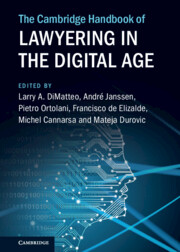Book contents
- The Cambridge Handbook of Lawyering in the Digital Age
- The Cambridge Handbook of Lawyering in the Digital Age
- Copyright page
- Contents
- Detailed Contents
- Figures
- Contributors
- Preface
- 1 Lawyering in the Digital Age
- Part I Effects of Technology on Legal Practice
- 2 Disruptive Effects of Legal Tech
- 3 The Effects of Technology on Legal Practice
- 4 Legal Drafting and Automation
- 5 Emerging Rules on Artificial Intelligence
- Part II Legal Tech and ADR
- Part III Legal Tech in Consumer Relations and Small Claims
- Part IV Legal Tech and Public Law
- Part V Legal Ethics and Societal Values Confront Technology
- Part VI Fate of the Legal Professions
3 - The Effects of Technology on Legal Practice
From Punch Card to Artificial Intelligence?
from Part I - Effects of Technology on Legal Practice
Published online by Cambridge University Press: 18 November 2021
- The Cambridge Handbook of Lawyering in the Digital Age
- The Cambridge Handbook of Lawyering in the Digital Age
- Copyright page
- Contents
- Detailed Contents
- Figures
- Contributors
- Preface
- 1 Lawyering in the Digital Age
- Part I Effects of Technology on Legal Practice
- 2 Disruptive Effects of Legal Tech
- 3 The Effects of Technology on Legal Practice
- 4 Legal Drafting and Automation
- 5 Emerging Rules on Artificial Intelligence
- Part II Legal Tech and ADR
- Part III Legal Tech in Consumer Relations and Small Claims
- Part IV Legal Tech and Public Law
- Part V Legal Ethics and Societal Values Confront Technology
- Part VI Fate of the Legal Professions
Summary
It is difficult to come up with any events after World War II that have led our entire global society to recognise that before The Times They Are A‐Changin’1 as clearly as today’s global crisis has done. The COVID-19 pandemic and its aftermath have revealed that almost everything we once considered stable and sustainable is actually built on quite shaky ground. But the crisis has also brought out the best in our coexistence, seeing that societies in many countries have shown that they are capable of finding creative solutions to overcome the current challenges. Digital technologies have played a crucial role in the world’s response to the COVID-19 crisis. Just think of modern methods of telecommunication such as video conferencing, which have made an immense contribution to maintaining the economy and work processes, or the various corona tracking apps, which try to help stopping the spread of the virus. It can be assumed that the harmful consequences of the pandemic would have grown even greater if those digital solutions had not been available. Just as almost every area of life is affected by the pandemic, so are the law itself and legal practice.
- Type
- Chapter
- Information
- The Cambridge Handbook of Lawyering in the Digital Age , pp. 38 - 56Publisher: Cambridge University PressPrint publication year: 2021



